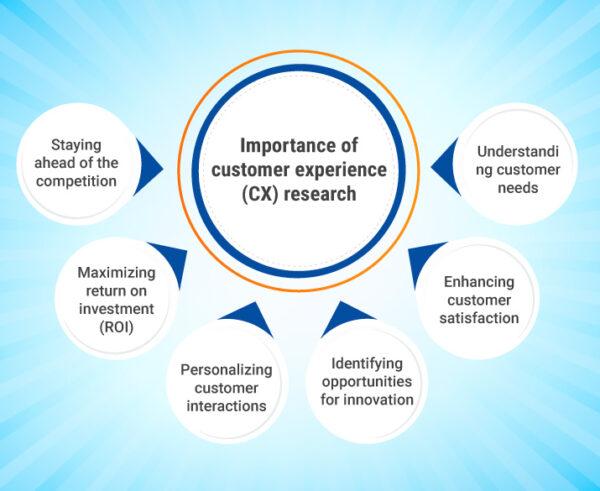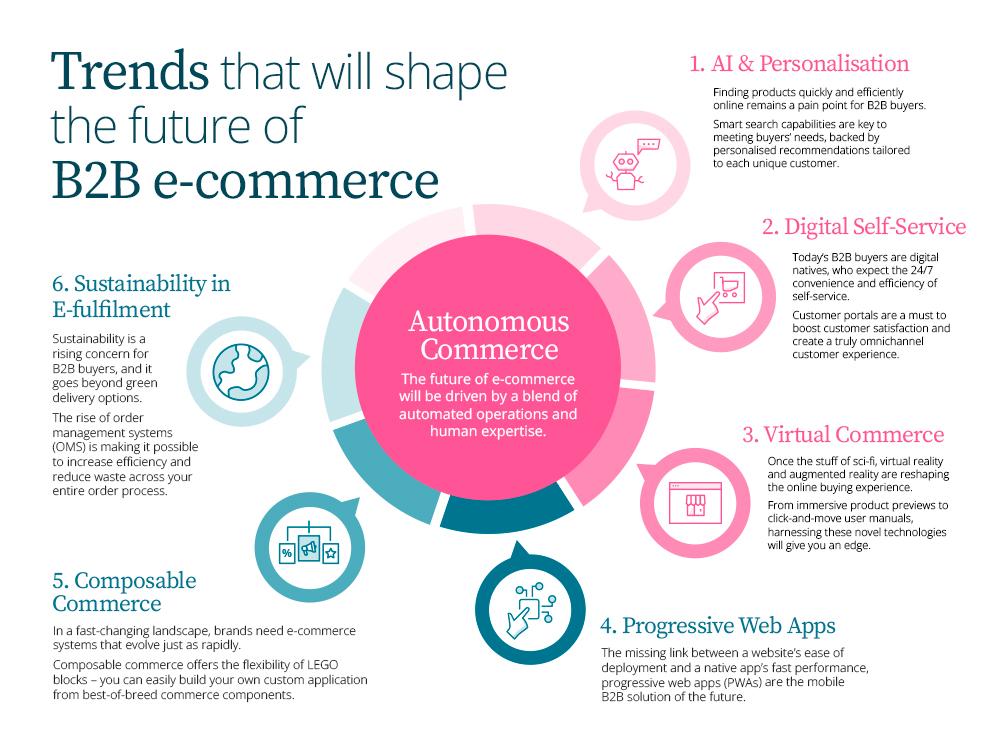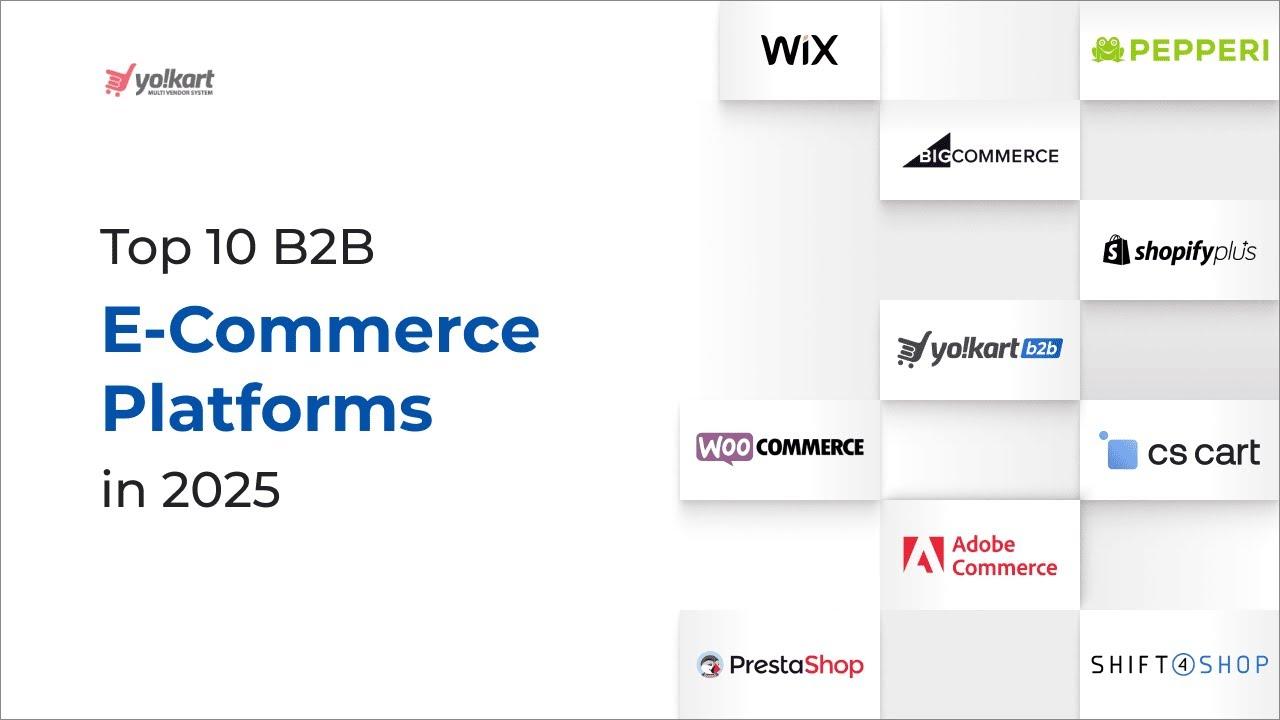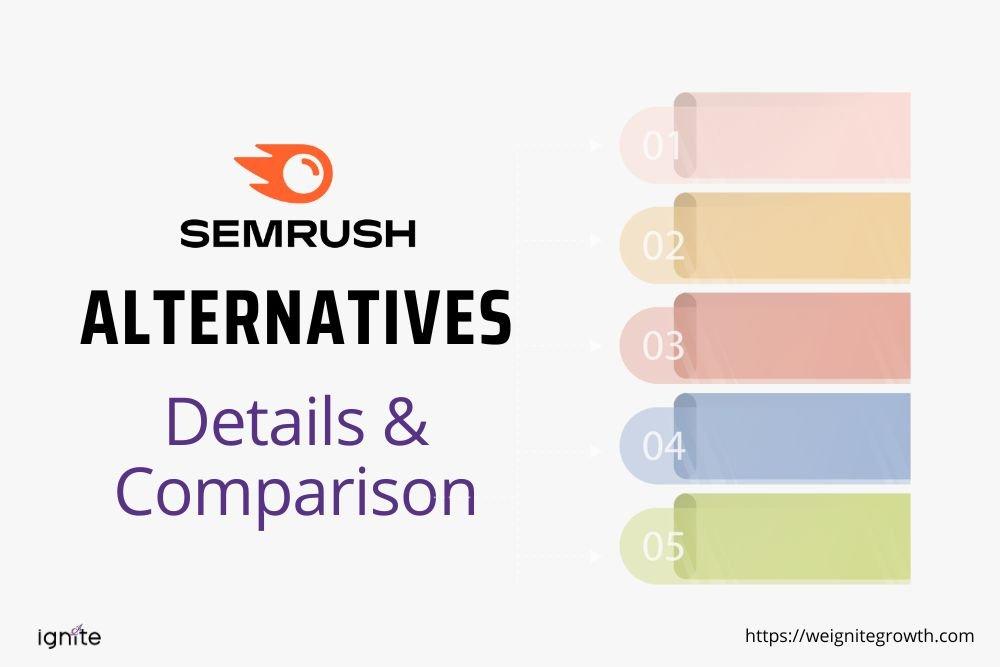In today’s fast-paced digital landscape, businesses are constantly on the lookout for innovative ways to boost thier revenue and streamline operations.If you’re in the B2B space, you know that having the right commerce platform can make all the difference in reaching your customers and closing deals. But with so many options out there, how do you know which one to choose? That’s where we come in! In this article, we’ll explore the 8 best B2B commerce platforms that can definitely help you unlock new revenue streams. Whether you’re a seasoned pro or just dipping your toes into the world of online sales, these platforms offer the tools and features you need to thrive. So, buckle up and get ready to discover the solutions that can elevate your business and set you on the path to success!
Discover the Benefits of B2B Commerce Platforms for Your Business
In today’s fast-paced business environment, having a robust B2B commerce platform is essential for companies looking to thrive and expand their market reach. These platforms are designed to streamline operations, enhance customer relationships, and ultimately drive revenue. Here are several compelling benefits of integrating a B2B commerce platform into your existing business model:
- Enhanced Efficiency: Automated processes reduce manual workload, allowing your team to focus on strategic initiatives rather than mundane tasks. This increase in operational efficiency leads to faster order processing and fulfillment.
- Improved Customer Experience: B2B commerce platforms often come with advanced features like personalized dashboards and tailored recommendations, enhancing the buying experience for customers and fostering loyalty.
- Robust Analytics: Access to detailed analytics allows businesses to track customer behavior, sales trends, and inventory levels in real time.This data can inform decision-making, helping to fine-tune marketing strategies and product offerings.
- Scalability: as your business grows, your B2B commerce platform can scale with you. Whether it’s handling a surge in orders or accommodating new product lines, these platforms are designed to grow alongside your business.
- Integration Capabilities: Modern B2B platforms can seamlessly integrate with existing software, including CRM systems and inventory management tools, creating a unified approach to business operations.
Additionally, the ability to reach a global audience cannot be overstated. B2B commerce platforms enable you to sell to customers nonetheless of their location, breaking down geographical barriers and opening up new markets. With features like multi-currency support and localized content, your business can cater to the unique needs of various regions.
One of the standout features of many B2B platforms is their focus on security. With transactions being conducted online, robust security measures are crucial to protect sensitive data and build trust with clients. Most platforms offer encryption and compliance with industry standards, ensuring that your business and customer information remains safe.
to help you navigate the various options available,consider the following table that outlines key features of top B2B commerce platforms:
| Platform | Key Features | Best For |
|---|---|---|
| Shopify Plus | Scalability,Customization,Security | Growing Enterprises |
| BigCommerce | Multi-Channel Selling,SEO Features | Market Expansion |
| Magento Commerce | Versatility,Integration,Personalization | Large Corporations |
| WooCommerce | Cost-Effective,Customizable,WordPress Integration | Small to Medium Businesses |
By leveraging the features and capabilities of a B2B commerce platform,you can create a more agile business that not only meets customer demands but exceeds their expectations. Embracing digital change through these platforms is not just an option; it’s a pathway to sustained growth and competitive advantage.
How to Choose the Right B2B Commerce Platform for Your Needs
Choosing the right B2B commerce platform is crucial for scaling your business effectively. With a plethora of options available, it can be challenging to pinpoint which solution aligns best with your specific needs. Here are some core factors to consider that will guide you towards making the right choice.
- Scalability: Your platform should be able to grow with your business. Look for solutions that can handle increased traffic and transactions as you expand. this flexibility is essential for future-proofing your operations.
- Customizability: every business has unique processes. Ensure the platform allows for customization so you can tailor it to your specific workflows and branding without meaningful limitations.
- User Experience: A clean, intuitive interface can drastically improve user engagement. prioritize platforms that offer a smooth user experience for both buyers and sellers.
- Integration Capabilities: Look for platforms that easily integrate with your existing systems—such as CRMs, ERPs, and marketing tools. Seamless integration minimizes disruptions and enhances operational efficiency.
- Security Features: Security is non-negotiable in B2B transactions. Choose a platform that complies with industry standards and offers robust security features, ensuring your business and customer data are well protected.
- Customer Support: Reliable customer support can make a significant difference, especially during the initial implementation phase. Opt for platforms that provide complete support options, including documentation, live chat, and dedicated account managers.
Additionally, it’s wise to consider the pricing structure of the platforms you’re evaluating. Some may have hidden fees or charge based on usage, while others might offer a flat-rate model. Here’s a simple comparison table to help you visualize potential costs:
| Platform | Pricing Model | Starting Price |
|---|---|---|
| Platform A | Monthly Subscription | $200 |
| Platform B | Pay-as-you-go | Variable |
| Platform C | Tiered Pricing | $500 |
Lastly, don’t overlook the importance of customer feedback. Researching reviews and case studies can provide valuable insights into the effectiveness and reliability of a platform. Engaging with othre businesses in your industry can also yield recommendations based on real-world experiences.
By taking these factors into account, you’ll be well-equipped to select a B2B commerce platform that not only meets your current needs but also positions you for future success and revenue growth.
Exploring Key Features that Drive B2B success
In the fast-paced world of B2B commerce, having the right platform is essential for unlocking new revenue streams. Today’s leading B2B commerce platforms offer a myriad of features that empower businesses to thrive in competitive markets.Here are some key functionalities that you should look for:
- Seamless integration: The ability to integrate with existing systems, such as CRM and ERP solutions, is crucial.This ensures a fluid workflow and data consistency across all channels.
- User-Amiable Interface: A simple and intuitive interface can considerably enhance the user experience. Both buyers and sellers should find it easy to navigate, ensuring a smooth purchasing process.
- Customizable Catalogs: The flexibility to create personalized catalogs tailored to specific clients can drive engagement and sales. Customers appreciate seeing products that meet their unique needs.
- Advanced Analytics: Tracking user behavior and sales trends through robust analytics tools can help businesses make informed decisions. This feature can highlight areas for growth and optimization.
- Mobile Compatibility: with an increasing number of buyers shopping on mobile devices, ensuring your platform is mobile-friendly is a non-negotiable aspect of modern commerce.
Moreover, the implementation of effective payment solutions cannot be overlooked. B2B transactions often involve larger sums of money, and having multiple payment options enhances security and convenience for buyers. Additionally,platforms that offer subscription billing and invoicing features can simplify the purchasing process,driving customer satisfaction.
To make informed decisions, businesses should also consider platforms that provide multi-channel capabilities.This allows for selling across various channels—whether it’s through a website, social media, or marketplaces—maximizing exposure and sales opportunities.
| Feature | Benefit |
|---|---|
| Seamless Integration | Enhances efficiency and workflow |
| User-Friendly Interface | Improves customer experience |
| Customizable Catalogs | Increases customer engagement |
| advanced Analytics | Informs strategic decisions |
| Mobile Compatibility | caters to on-the-go buyers |
Lastly, customer support should be prioritized. Look for platforms that offer robust support options,such as live chat,phone support,and extensive documentation. Rapid and effective support can be the difference between a smooth transaction and a frustrated customer.

Unleashing Sales Potential with Customization Options
In the ever-evolving landscape of B2B commerce, one of the most powerful tools at your disposal is the ability to offer customization options. This feature not only differentiates your brand but also directly addresses the unique needs of your clients.By enabling businesses to tailor products and services to their specifications, you create a powerful incentive for them to choose your platform over competitors.
Customization options can take many forms:
- Product personalization: Allow customers to modify features, sizes, and colors to suit their needs.
- Bespoke Pricing: Implement dynamic pricing models that adjust based on client volume or contract length.
- flexible Payment Terms: Offer various payment plans that cater to diffrent cash flow scenarios.
- Custom Integrations: enable businesses to seamlessly integrate your platform with their existing systems.
When clients feel they have a hand in shaping the products they purchase, their engagement and loyalty increase significantly. This is especially true in B2B transactions, where the stakes are higher and the relationships are frequently enough longer-term. A tailored experience not only boosts customer satisfaction but also drives repeat business and referrals.
Consider implementing a user-friendly interface that makes customization easy. A well-designed configuration tool can visually guide clients through their options, making the process enjoyable and efficient. This reduces friction in the buying journey and enhances the overall customer experience.
Moreover, offering customization can lead to higher average order values. When businesses have the ability to create tailored solutions, they are often willing to spend more to get exactly what they need. This not only increases revenue but also strengthens your position as a trusted partner in their success.
leveraging customization options on your B2B commerce platform is not just about enhancing product offerings; it’s about creating a holistic experience that resonates with your clients. As you explore the best platforms for your business, prioritize those that emphasize flexibility and personalization. The potential for revenue growth through tailored solutions is immense, and the time to act is now.

Integrating B2B Platforms with your Existing Systems
is a transformative step that can streamline your operations and enhance your overall efficiency. By ensuring seamless communication between different software solutions, you can facilitate better data sharing, improve customer interactions, and ultimately drive more revenue.Here are some critical aspects to consider when integrating these platforms:
- Assess Current Systems: Start by taking a comprehensive inventory of your existing systems. Understand how each one functions and where they excel or fall short. This will provide clarity on what needs to be integrated and optimized.
- Prioritize Compatibility: Not all platforms are built the same; some may communicate better with your existing systems than others. Focus on B2B solutions that offer robust APIs or integration capabilities to ensure smooth data exchange.
- Automate Processes: Integration should be about simplifying your workflows. Look for opportunities to automate repetitive tasks, such as order processing and inventory management, which can save time and reduce the risk of human error.
- Data Centralization: A unified view of your data is vital for informed decision-making. Integrating your B2B platform with existing systems allows you to centralize data, making it accessible and actionable across the association.
When planning your integration, it’s also essential to consider the user experience. Depending on how intuitive the interface is, your team may need to undergo training. Providing resources to help employees adapt to the new systems can ease the transition and encourage adoption.
Furthermore, prosperous integration goes beyond technology; it requires a change management strategy. Involve stakeholders from various departments early on, as their insights can help shape the process and ensure that the new system serves everyone’s needs effectively.
don’t neglect the importance of ongoing support and maintenance. choosing a B2B platform with strong customer support can help you resolve issues quickly,ensuring that your integrated systems continue to perform optimally as your business grows.
| Integration challenges | Solutions |
|---|---|
| Data Silos | Implement centralized data repositories. |
| Technical Compatibility | Choose platforms with strong APIs. |
| User Resistance | provide adequate training and support. |
| Ongoing maintenance | Establish a dedicated support team. |

Maximizing Customer Experience through User-Friendly Interfaces
In the realm of B2B commerce, the importance of a user-friendly interface cannot be overstated. Businesses today are looking for platforms that not only streamline operations but also enhance the overall customer experience.When a platform is intuitive and easy to navigate, it fosters trust and encourages long-term relationships. Here’s how an extraordinary user interface can transform your B2B dealings:
- Intuitive Navigation: A well-structured interface allows users to find what they need quickly. This reduces frustration and keeps potential customers engaged.
- Personalization: Tailored experiences based on user behavior can significantly boost satisfaction. Platforms that adapt to individual preferences can make the buyer’s journey smoother.
- Mobile Optimization: With an increasing number of users accessing platforms via mobile devices, ensuring a responsive design is essential. A mobile-friendly interface can enhance accessibility and widen your reach.
- Clear Calls to Action: Well-placed, easily identifiable CTAs guide users through the purchasing process, increasing conversion rates. When customers know exactly what to do next, they’re more likely to complete their purchases.
moreover, the integration of effective search functionalities can significantly impact user satisfaction. Platforms that offer advanced search options—like filters and sorting tools—enable users to find specific products or services with ease. This not only saves time but also enhances the likelihood of a purchase.A seamless search experience can be a game-changer in capturing and retaining customer interest.
The visual aspect of the user interface also plays a crucial role. Clean designs that prioritize readability and aesthetics can draw users in. Effective use of color, typography, and whitespace not only improves usability but also reinforces your brand identity. Remember, a visually appealing platform can leave a lasting impression, making it more likely for customers to return.
don’t overlook the importance of feedback loops. Providing customers with the ability to easily share their thoughts on their experience can definitely help you identify pain points and areas for improvement. Actively soliciting feedback not only shows that you value customer input but also empowers you to continuously enhance the platform to meet their evolving needs.

Harnessing Data Analytics to Boost Your B2B Strategy
In today’s competitive B2B landscape, leveraging data analytics can transform your business strategy from reactive to proactive. By utilizing analytics, companies can uncover valuable insights that drive decision-making and enhance customer relationships. This approach not only optimizes existing processes but also opens avenues for new revenue streams.
Understand Customer Behavior: One of the primary advantages of data analytics is its ability to provide a clear picture of customer behavior. Analyzing purchasing patterns, preferences, and feedback can help you tailor your offerings to better meet the needs of your clients. As a notable example, if data reveals that a certain product line is notably popular among specific sectors, you can focus your marketing efforts accordingly, boosting conversion rates.
Enhance Market Segmentation: Data analytics allows for more precise market segmentation. By identifying distinct groups within your customer base, you can create targeted marketing campaigns that resonate with each segment. This means more personalized messaging and a higher likelihood of engagement. With tools like predictive analytics, you can even forecast trends and adjust your strategies ahead of time.
Optimize Pricing Strategies: Data-driven insights can significantly enhance your pricing strategies.By analyzing competitor pricing, demand elasticity, and customer willingness to pay, you can set optimal prices that maximize profit margins while remaining competitive. A/B testing different price points can further reveal the most effective strategies to implement.
| Data analytics Benefits | Impact on B2B Strategy |
|---|---|
| Improved Decision Making | Data-backed insights lead to informed choices. |
| Increased Customer Satisfaction | tailored solutions meet customer needs effectively. |
| Revenue Generation | Identifying new opportunities for increase in sales. |
| Operational Efficiency | Streamlining processes to reduce costs and time. |
Measure Campaign Effectiveness: Analytics tools empower businesses to track the performance of marketing campaigns in real-time. By monitoring key performance indicators (KPIs) such as click-through rates and conversion rates, you can quickly assess what’s working and what’s not.This iterative approach allows you to refine your strategies on-the-fly, ensuring you are always optimizing your marketing efforts for maximum impact.
By harnessing the power of data analytics, B2B companies can not only refine their strategies but also create a more agile, responsive business model. This shift not only promotes growth but also enhances your competitive edge in the market. Let’s redefine how we approach B2B commerce with data-driven insights at the forefront.

Real-World Success Stories from Leading B2B Commerce Platforms
In the rapidly evolving landscape of B2B commerce, real-world success stories can serve as powerful examples of what’s possible when businesses embrace robust platforms. Companies that have capitalized on innovative B2B solutions not only streamline their operations but also unlock new revenue streams.Here are some remarkable case studies that highlight the transformative potential of leading B2B commerce platforms.
1. Global Manufacturing Giant - Streamlining Operations
A well-known manufacturing company faced challenges with its fragmented sales channels and manual processes. By implementing a top-tier B2B commerce platform, they integrated their sales operations, enabling real-time inventory updates and automated order processing. Consequently, they reported:
- 30% increase in order accuracy
- 25% reduction in processing time
- 15% boost in overall sales
2. Wholesale Distributor - Enhanced Customer engagement
A wholesale distributor struggled to maintain customer engagement through traditional sales methods. After transitioning to a B2B platform with personalized features, they enabled tailored experiences for each of their customers. This strategic move led to a significant uptick in customer satisfaction, measured by:
- 40% improvement in customer retention
- 50% rise in repeat purchases
3. tech Start-Up – Scaling Quickly
A tech start-up offering software solutions found itself struggling to scale its operations efficiently. By adopting an agile B2B commerce platform, they managed to launch new products swiftly and reach wider audiences. The results were impressive:
| Growth Metric | before Platform | After Platform |
|---|---|---|
| Monthly Revenue | $10,000 | $50,000 |
| New Clients Acquired | 5 | 25 |
4. Specialty Retailer – Expanding Market Reach
A specialty retailer focused on niche products sought to expand its market reach beyond local boundaries. By leveraging a B2B commerce platform with robust tools for international commerce, they successfully entered multiple new markets, resulting in:
- 60% growth in international sales
- 35% increase in overall market penetration
These success stories illustrate that the right B2B commerce platform can be a game-changer for businesses looking to enhance efficiency, improve customer experiences, and drive revenue growth. As more companies share their positive outcomes, it becomes clear that investing in a strong B2B solution is a crucial step toward unlocking new opportunities in the digital marketplace.

Future Trends in B2B Commerce You Shouldnt Ignore
As the B2B landscape continues to evolve, several trends are emerging that businesses must keep an eye on to stay competitive and capitalize on new revenue opportunities. Here are some key trends shaping the future of B2B commerce:
- Personalized Experiences: Just like in B2C, personalization is becoming crucial in B2B. Companies are leveraging data analytics to create tailored experiences for their clients. This not only enhances customer satisfaction but also builds long-term loyalty.
- AI and Automation: Artificial intelligence is transforming how businesses operate,from chatbots that handle customer inquiries to automated inventory management. Implementing these technologies can streamline operations and reduce costs, allowing teams to focus on strategic growth.
- Mobile Optimization: With more professionals conducting business on-the-go, mobile-friendly platforms are essential. Businesses that optimize their B2B commerce solutions for mobile are likely to capture a more extensive customer base.
- Social Selling: Social media is no longer just for B2C.B2B companies are leveraging platforms like LinkedIn to engage with prospects, share valuable content, and forge connections. This approach helps in building trust and establishing authority in the industry.
- Subscription Models: The rise of subscription-based services is infiltrating B2B transactions. This model provides predictable revenue streams and encourages customer retention. Companies that offer flexible pricing options can attract new clients and increase sales.
Additionally, the shift towards sustainability is influencing purchasing decisions. More B2B buyers are prioritizing eco-friendly practices and products, prompting businesses to adapt their offerings accordingly. Incorporating lasting practices not only meets customer demand but also enhances brand reputation.
| Trend | Impact on B2B |
|---|---|
| Personalized Experiences | Increased customer loyalty and satisfaction |
| AI and Automation | Operational efficiency and cost savings |
| Mobile Optimization | Wider customer reach and engagement |
| Social Selling | Enhanced trust and authority in the market |
| Subscription Models | Stable revenue and improved retention |
| Sustainability Focus | Better brand reputation and customer preference |
Staying ahead of these trends is essential for B2B businesses looking to thrive in an increasingly competitive landscape. By embracing these changes, companies can unlock new avenues for growth and maximize their revenue potential.

Why Scalability Matters for Growing Your Business
In today’s fast-paced business landscape, the ability to scale effectively is a crucial factor that can make or break an organization. As companies strive to expand their reach and enhance their offerings, the underlying technology must support rapid growth without sacrificing performance or customer experience. A scalable B2B commerce platform allows businesses to seamlessly adapt to changes in demand and leverage new opportunities as they arise.
When selecting a commerce platform, consider these key factors that highlight the importance of scalability:
- Flexibility in Operations: A scalable platform can adjust to fluctuations in sales volume, ensuring that your operations remain smooth even during peak seasons.
- Future-Proofing: Investing in scalable technology means that your business can evolve and incorporate new features without necessitating a complete overhaul of your existing systems.
- Cost Efficiency: With a scalable solution, businesses can manage costs effectively, as resources can be allocated based on current needs rather than overcommitting upfront.
- Enhanced Customer Experience: As your business grows, maintaining a consistent and high-quality customer experience is vital. scalable platforms allow for the integration of advanced tools and functionalities, ensuring customer satisfaction at every stage of their journey.
Moreover, scalability promotes collaboration across different departments within your business.Marketing, sales, and customer support can work in harmony, using a unified platform to share insights and data, which fosters innovation and drives better decision-making.This interconnectedness is particularly beneficial as your business expands into new markets or diversifies its product offerings.
Ultimately, choosing a scalable B2B commerce platform isn’t just about meeting today’s needs; it’s about preparing for tomorrow’s challenges and opportunities. By opting for a solution that can grow alongside your business, you position yourself to not only survive but thrive in an increasingly competitive marketplace.
| Platform | Scalability Features | Best For |
|---|---|---|
| Shopify plus | Multi-channel selling, high traffic handling | Startups to large enterprises |
| Magento Commerce | Customizable solutions, cloud hosting | Mid-sized to large businesses |
| BigCommerce | No transaction fees, strong API | High-growth brands |
| WooCommerce | WordPress integration, extensibility | Small to medium enterprises |

The Importance of Security in B2B Transactions
In the fast-paced world of B2B commerce, ensuring the security of transactions is more vital than ever. Businesses are not only exchanging goods and services but also sensitive information that, if compromised, can lead to severe consequences. A robust security framework builds trust and fosters long-term relationships, which are essential for sustained growth.
One of the most significant aspects of security in B2B transactions is the protection of financial data. With the rise in cyber threats, organizations must invest in secure payment gateways and encryption technologies. This protects against data breaches and helps maintain the confidentiality of sensitive information,which is crucial when dealing with high-value transactions.
Moreover, implementing multi-factor authentication (MFA) can significantly enhance security measures. By requiring users to provide multiple forms of verification before granting access, businesses can reduce the risk of unauthorized access to accounts. This level of precaution is particularly important for platforms that handle large volumes of transactions.
- Compliance with regulations: Adhering to industry standards such as GDPR or PCI DSS not only enhances security but also builds credibility with partners and customers.
- Regular security audits: Conducting thorough audits and vulnerability assessments can help identify potential weaknesses and address them proactively.
- User education: Training employees and stakeholders about security best practices can create a culture of security awareness that strengthens the entire organization.
| Security Feature | Benefit |
|---|---|
| Encryption | protects data during transmission |
| firewall | Blocks unauthorized access |
| Intrusion Detection Systems | Monitors suspicious activity |
| Secure Payment Processing | Ensures safe transactions |
Ultimately, prioritizing security in B2B transactions is not just about protecting data; it’s about cultivating a trustworthy marketplace. When businesses feel secure in their dealings, they are more likely to engage in repeat transactions, open new lines of communication, and explore innovative partnerships. The right commerce platform should seamlessly integrate these security features, providing peace of mind for all parties involved.

Final Thoughts on Unlocking New Revenue with the Right Platform
As we navigate the ever-evolving landscape of B2B commerce, the right platform can be the game-changer your business needs to tap into new revenue streams. With so many options available, choosing a solution that aligns with your unique goals and operational needs is critical. Here’s why investing in the right platform is essential for unlocking growth.
Flexibility and Scalability
A robust B2B commerce platform offers the flexibility to adapt to changing market demands. as your business grows, the right solution will scale with you, ensuring that you can manage increased traffic and transactions without compromising performance. This growth potential means that your platform should support:
- Customizable workflows that suit your business processes
- Integration with existing systems for seamless operations
- Support for diverse payment methods to cater to various customer preferences
Enhanced Customer Experience
Today’s buyers expect a seamless and engaging shopping experience. A cutting-edge B2B platform can help you deliver just that. With features like:
- User-friendly interfaces that enhance navigation
- Personalized recommendations based on customer behavior
- Real-time inventory updates to avoid disappointments
These elements contribute to higher customer satisfaction and loyalty, ultimately driving repeat purchases and increasing lifetime value.
Data-Driven Decision Making
Leveraging data analytics is crucial in making informed business decisions. A powerful B2B commerce platform provides insights into:
- Customer buying patterns and preferences
- Sales trends and performance metrics
- Market demands and emerging opportunities
By utilizing these insights, businesses can adjust their strategies, target marketing efforts effectively, and capitalize on emerging trends.
| Feature | importance |
|---|---|
| Customization | Aligns platform functionality with business needs |
| Integration | Ensures seamless operations across systems |
| Analytics | Drives strategic decision-making |
Ultimately, the right B2B commerce platform can serve as a solid foundation for your revenue growth strategy. By focusing on flexibility, customer experience, and data utilization, businesses are not just unlocking potential revenue—they’re building a sustainable future. The platforms highlighted in this post can help pave the way for your success, offering the tools necessary to thrive in a competitive marketplace.
Frequently Asked Questions (FAQ)
Q&A: 8 Best B2B commerce Platforms to Unlock New Revenue
Q1: Why should businesses consider a B2B commerce platform?
A1: Great question! B2B commerce platforms are essential for businesses looking to streamline their sales processes and reach new customers. They not only enhance efficiency but also open up new revenue streams by providing a robust online presence. In today’s digital age, having a dedicated platform allows for smoother transactions, better customer relationships, and improved inventory management—all of which contribute to increased profitability.
Q2: What features should I look for in a B2B commerce platform?
A2: When selecting a B2B commerce platform, consider features like user-friendly interface, custom pricing, bulk ordering capabilities, integration with existing ERP systems, and strong customer support. Additionally, look for platforms that offer mobile compatibility and advanced analytics. These features will help you cater to your clients’ needs more effectively and make data-driven decisions to boost revenue.
Q3: Can you share some specific platforms that are ideal for B2B commerce?
A3: Absolutely! Here are eight standout platforms that can definitely help unlock new revenue:
- Shopify Plus – Known for its scalability and ease of use, it’s perfect for high-volume B2B operations.
- Magento Commerce – Offers extensive customization options and is great for businesses with complex needs.
- BigCommerce – A strong platform that provides a comprehensive set of B2B features including bulk discounts and custom pricing.
- Oracle NetSuite – An all-in-one solution that combines ERP and e-commerce capabilities for significant operational efficiency.
- SAP Commerce Cloud – Ideal for larger enterprises, it offers robust functionalities tailored for B2B transactions.
- Zoho Commerce – A user-friendly platform that integrates well with other Zoho products, perfect for small to mid-sized businesses.
- WooCommerce – A flexible option for those already using wordpress, with numerous plugins for added functionality.
- Salesforce commerce Cloud – Excellent for companies looking to leverage CRM and e-commerce to enhance customer engagement.
Q4: How can a B2B commerce platform help with customer relationships?
A4: A solid B2B commerce platform can dramatically improve customer relationships by providing personalized experiences. Features like account management, order history tracking, and tailored recommendations can make customers feel valued and understood. additionally, with integrated CRM tools, you can track interactions, gather feedback, and adjust your offerings based on customer preferences, leading to stronger bonds and increased loyalty.
Q5: What are some common mistakes to avoid when choosing a B2B commerce platform?
A5: One of the biggest mistakes is not aligning the platform’s capabilities with your business needs. It’s essential to assess your requirements before making a choice. Another pitfall is underestimating the importance of mobile optimization; with many users shopping on mobile, ensure that your platform is responsive. Lastly, neglecting to consider long-term scalability can limit your growth potential, so opt for a solution that can grow with your business.
Q6: Are there any success stories of businesses that have benefited from B2B commerce platforms?
A6: Absolutely! Such as, a mid-sized manufacturing company saw a 30% increase in sales after migrating to a B2B platform that allowed them to manage their inventory more effectively and offer personalized pricing. Another case is an online wholesaler that doubled its customer base within a year of implementing an intuitive B2B commerce solution, thanks to enhanced user experience and streamlined ordering processes.These success stories highlight the transformative impact of choosing the right platform.
Q7: How can I measure the success of my B2B commerce platform?
A7: Measuring success can be done through various metrics. Look at sales growth, customer acquisition costs, average order value, and customer retention rates. Additionally, keep an eye on website traffic and conversion rates. Using analytics tools integrated with your platform will allow you to track these metrics easily and make informed decisions for continuous improvement.
Q8: Is it worth investing in a B2B commerce platform now, or should I wait?
A8: The short answer? Invest now! The digital landscape is evolving rapidly, and waiting could mean missing out on significant revenue opportunities. Businesses that embrace B2B commerce platforms today are better positioned to adapt to market changes and meet customer expectations. Plus, early adoption allows you to learn and optimize your strategy over time, giving you a competitive edge.
Ready to explore how a B2B commerce platform can transform your business? The right choice can unlock new revenue streams and elevate your customer experience. don’t wait—start your journey today!
In Conclusion
As we wrap up our exploration of the 8 best B2B Commerce Platforms to Unlock New Revenue, it’s clear that choosing the right platform is more than just a technical decision—it’s a strategic move that can redefine your business landscape. Each of these platforms brings unique strengths to the table, catering to different needs and goals.Remember, the key to unlocking new revenue isn’t just about having the latest technology; it’s about how you leverage these tools to enhance customer experiences, streamline operations, and drive growth. whether you’re a seasoned player looking to upgrade or a newcomer eager to make your mark,the right platform can be your secret weapon in today’s competitive marketplace.
So, take the time to assess your business needs, explore the options we’ve discussed, and don’t hesitate to invest in a solution that aligns with your vision.The opportunity to elevate your business is right at your fingertips—are you ready to seize it? Dive in, explore, and watch as new avenues of revenue unfold before you. Happy selling!


